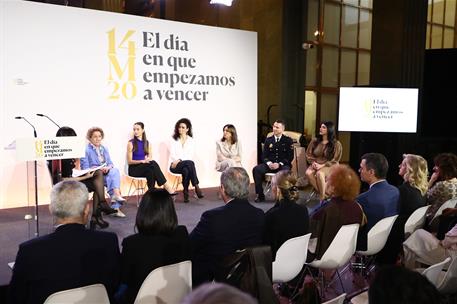Sánchez vindicates the "lesson in civic patriotism" given by Spanish society in its fight against COVID-19
President's News - 2024.3.13
Summary of the event '14M. The day we began to win' | Pool Moncloa/Jorge Villar y Javier Amescua - 2024.3.13
Cervantes Institute, Madrid
"Never before have we realised our collective strength, our determination", said the chief executive, who underlined Spain's "collective achievement", the result of "an exemplary citizenship which, during the hardest times in recent years, exuded previously unimaginable commitment, maturity and temperance".
Under the heading '14M. El día en que empezamos a vencer', and within the framework of the Cervantes Institute, Pedro Sánchez pointed out that it was thanks to the adoption of "very tough decisions", to "confidence in science" and to the "exemplary behaviour of society" that we were able to defeat the pandemic. In a previous colloquium, representatives of sectors that were particularly involved during the pandemic, including Carmen Carbone (nurse), Inés Bergua (sportswoman), Lourdes Ramírez (teacher), Isabel Vidal (cultural entrepreneur), Jorge Isasi (local police) and Kim Gutiérrez (migrant entrepreneur), also spoke about their experiences.
"With the benefit of hindsight, we know today that that decision [the declaration of the state of alarm"] was a "top priority for the experts, and was fundamental to bend the curve", and that "social distancing and limited mobility saved lives". The president went on to say that "this was the only way we could stop the spread of the virus, avoid the saturation of our healthcare system and gain time until science and knowledge could come to the rescue of the entire world population", recalling the appearance in which he announced this measure, which was "the most difficult one I have had to face in the exercise of my responsibility as President of the Government".
He also referred to the "leaders", who at the time spoke of achieving herd immunity because that it was better for the economy than confinement, calling it "brutal logic" in reference to the fact that it "meant sentencing to death hundreds of thousands of human beings, especially our elders", and who "were quick to back down, because of the tremendous human cost and because it meant turning their backs on science".
We reinforce our confidence in science, in the role of the state and in the need for a good public health system
At another point in his speech, the President of the Government also referred to the fact that in the 100 days of confinement and the months that followed, we reinforced some certainties and learned many things. "We reinforce our confidence in the contribution of science - in which we will continue to trust, investing more in it - and our faith in the role of the state as an instrument of solidarity and as the most powerful safety net in the face of misfortune; and we reinforce our conviction that a good public health system is the safest investment".
The president went on to say that "we discovered that the ERTEs saved many jobs (like the ICO credits for many companies), that they put wages on the table for more than 3 million workers, and that we pushed ahead with the Minimum Basic Income, as a strategic tool for solidarity. "We also learned that Europe can deal with crises in an effective, coordinated and united way, unlike during the financial crisis".
"We learned that we are a mature and responsible society, free but disciplined when circumstances demand it; that we protect the vulnerable, that we do not give up in the face of adversity. We learned to trust ourselves more" and "to look at ourselves as the extraordinary country that we are", he concluded.
The event was also attended by the First Vice-President and Minister for Treasury, María Jesús Montero; the Second Vice-President and Minister for Work and Social Economy, Yolanda Díaz, and the Minister for Health, Mónica García.
Non official translation





